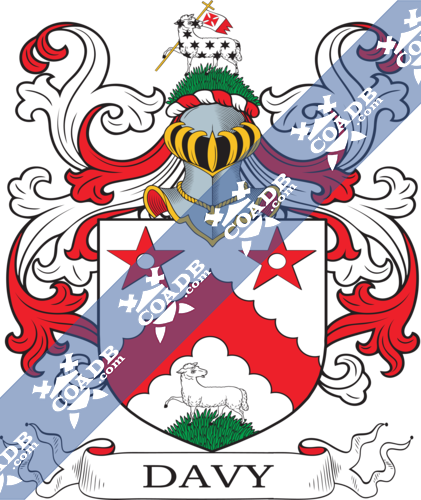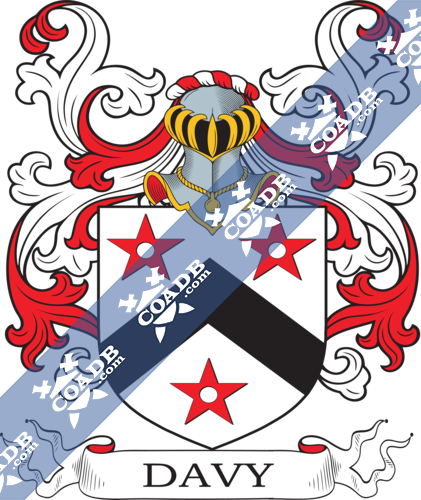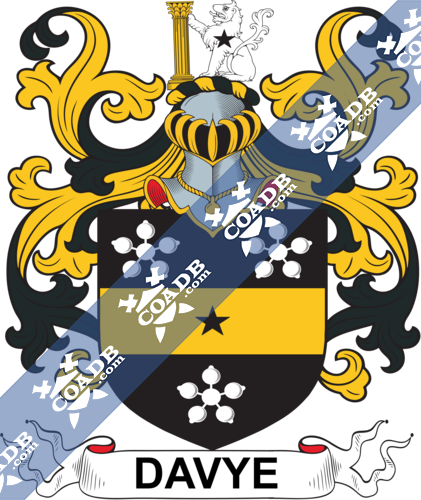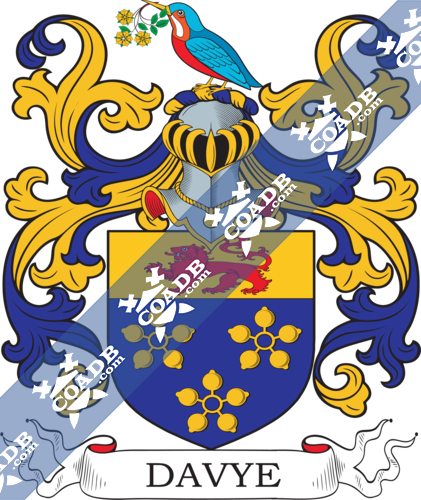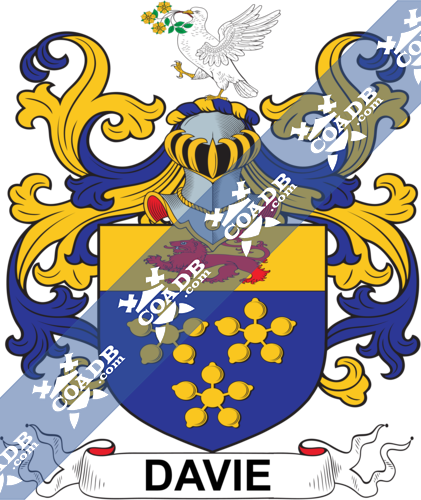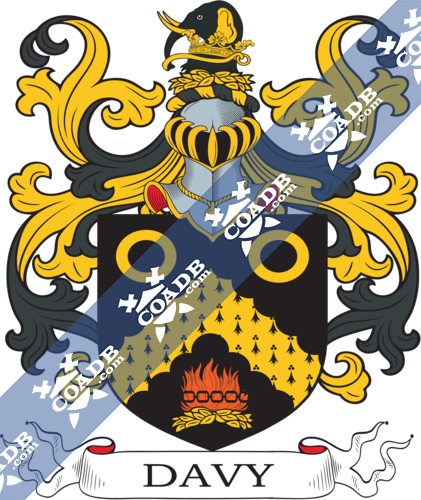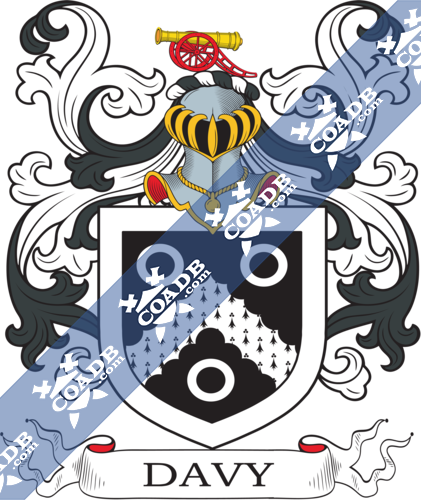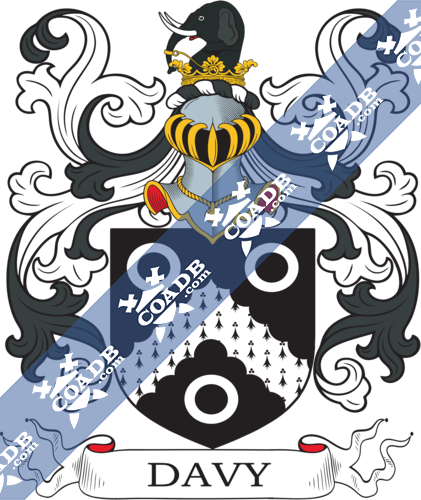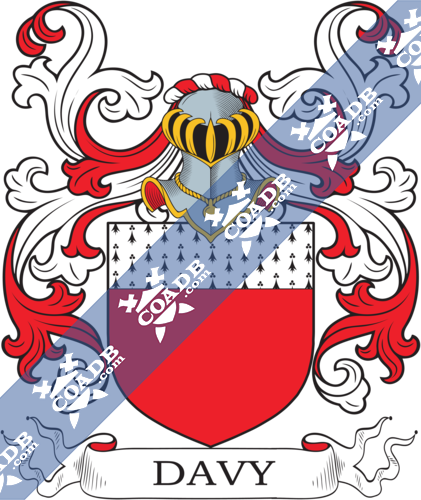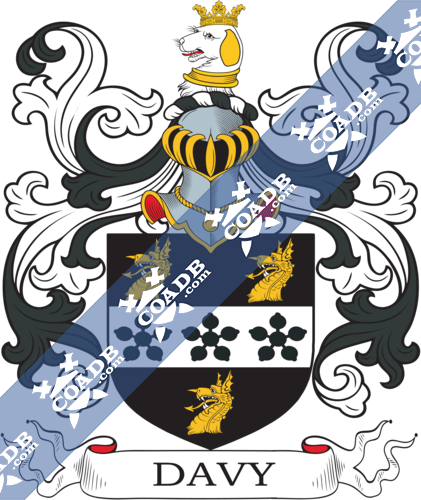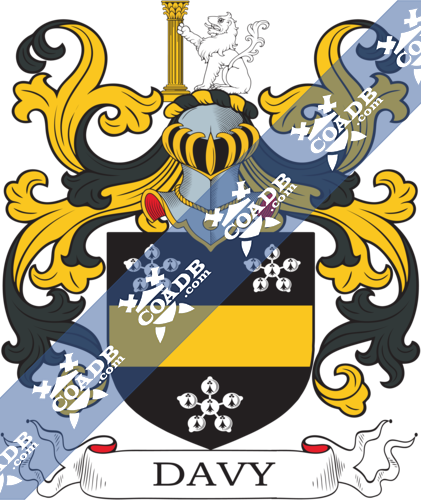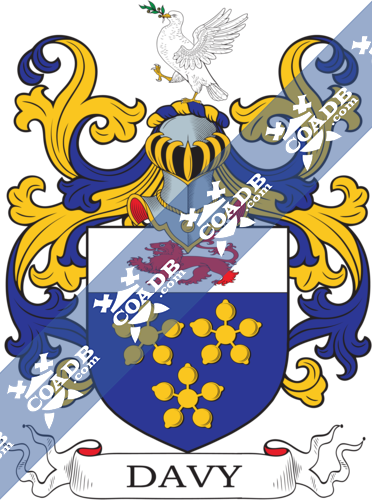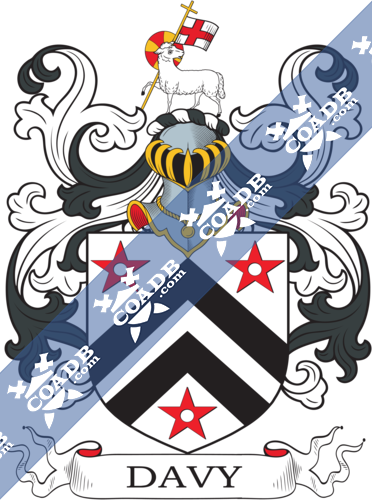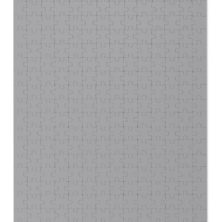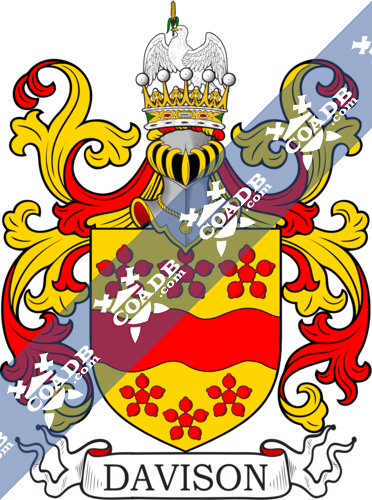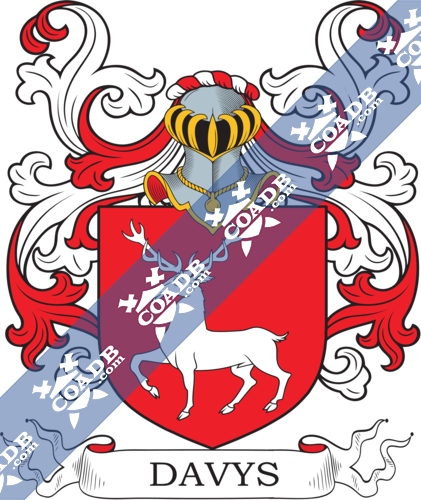Davy Family Crest, Coat of Arms and Name History
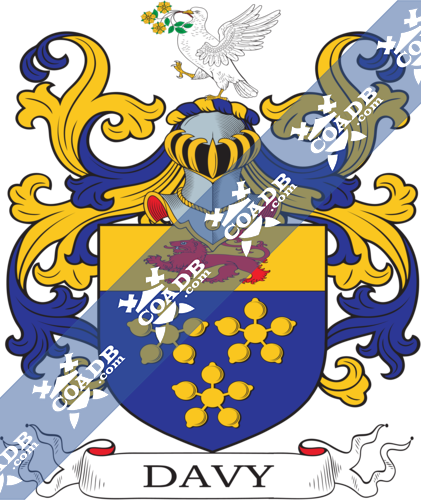
Davy Coat of Arms Gallery
Don’t know which Coat of Arms is yours?
We can do a genealogical research. Find out the exact history of your family!
Learn MoreDavy Origin:
France, Wales
Origins of Davy:
It is a nickname from Hebrew origins, and related to Wales. It means ‘the child of David,’ from the Hebrew male name which means “beloved”. The name is not listed in any area of Britain before the Norman invasion of the year in 1066. In the 12th century, all the regions of Christendom combined in crusades to save the Holy Land from infidels. Though all failed, the returning soldiers ‘gained’ real religious and Greek names, of which David was one, and provided them to their offspring. According to the very oldest registers, the first recording is that of ‘Dauid clericus,’ (David, the clerk), in the rolls of the county of Lincoln for the year 1150, while Richard Davy shows in the premium rolls of Worcester for the year 1275. More examples consist of Thomas Dayson in the 1327 Pipe Rolls of Yorkshire, and Richard Davys recorded in the record of the Freemen of the City of York for the year 1402. An attractive holder of the name was Sir Thomas Davies (1631 – 1680), a retailer of the books, who became senior head of the book seller’s Guild in 1668 and was king Mayor of London in 1666, among the Great War of London.
Variations:
More common variations are: Davey, Deavy, Davay, Daviy, Davoy, Davya, D Avy, Daevy, Dhavy, Davye.
France:
The origins of the surname Davy were found in Cornwall.
The very first recorded spelling of the family was shown to be that of John Dauisse, dated about 1327, in the premium rolls of the division of Cambridgeshire. It was during the time of King Edward III, who was known to be the “The Father of the Navy,” dated 1327-1377. The origin of surnames during this period became a necessity with the introduction of personal taxation. It came to be known as Poll Tax in England. Surnames all over the country began to develop, with unique and shocking spelling varieties of the original one.
Ireland:
Many of the people with name Davy had moved to Ireland during the 17th century.
United States of America:
Individuals with the surname Davy settled in the United States in three different centuries respectively in the 17th, 18th, and 19th. Some of the people with the name Davy who settled in the United States in the 17th century included Richard Davy arrived in Virginia in 1639. Elizabeth Davy and Thomas Davy, both landed in Maryland respectively in the years in 1649 and 1670. Humphrey Davy landed in Boston, Massachusetts in 1665. Daniel Davy settled in New England in 1652.
Some of the people with the surname Davy who settled in the United States in the 18th century included John Davy arrived in America in 1760-1763.
The following century saw more Davy surnames come. Some of the people with the surname Davy who settled in the United States in the 19th century included Edward Davy landed in New York in 1824. William Davy arrived in San Francisco, Carolina in the year in 1851.
Canada:
Some of the people with the surname Davy who settled in Canada in the 18th century included Francis Davy arrived in Saint John’s Newfoundland in 1759. Mr. John and Mr. Michael Davy, both arrived in Canada in the same year in 1784.
Australia:
Some of the people with the surname Davy who settled in Australia in the 19th century included Thomas Davy and Benjamin Davy arrived in Adelaide, Australia aboard the ships “Aboukir” and “Theresa” in the same year 1847. Thomas Davy who was an English prisoner from Suffolk, who shifted aboard the ships “Anson” in September in 1843, arrived in Van Diemen’s Land, Australia. Ralph E. Davy in Holdfast Bay, Australia aboard the ship “Africanize” in 1836. Maria Davy arrived in Adelaide, Australia aboard the ship “Katherine Stewart Forbes” in 1839.
New-Zealand:
Some of the people with the surname Davy who settled in New Zealand in the 19th century included Richard Davy arrived in Wellington, New Zealand in the year in 1841.
Here is the population distribution of the last name Davy: United States 3,961; England 4,103; Australia 1,812; Canada 1,313; South Africa 1,881; New-Zealand 717; France 5,400; Jamaica 1,089; Ivory Coast 1,023; Cambodia 1,954.
Notable People:
Edmund Davy (1785–1857), was a British expert in chemistry and a professor.
Edward Davy (1806–1885), was a British specialist and scholar.
Georges Davy (1883–1976), was a French sociologist.
Humphry Davy (1778–1829), was a British expert in chemistry.
Richard Davy (c. 1465–1507), was a Renaissance writer and organist.
William Davy (lawyer) (died 1780), was an English advocate.
Blazons & Genealogy Notes
1) (Creedy, co. Devon; granted 20 April, 1594). (Sandford, co. Devon). Az. three cinquefoils or, on a chief of the second a lion pass. gu. Crest—A dove with wings endorsed ppr. in the beak a spriff vert, thereon three roses or.
2) (co. Devon). Same Arms, the chief ar. Crest—A dove holding in the beak an olive branch all ppr.
3) (Rose Ash and Beaford, co. Devon. Visit. 1620). Ar. two chevronels sa. betw. three mullets pierced gu. Crest—A paschal lamb reguard. ar. holding a pennon of the last charged with a cross gu. staff or.
4) (Grosvenor Street, London, bart., extinct; Sir Humphry Davy, President of the Royal Society, was so created 1818, d. s. p. 1829). (commemorative of the invention of the safety lamp by Sir Humphry Davy). Motto—lgne constricto vita secura. (Lesketh How, co. Westmoreland). Sa. a chev. engr. erminois betw. two annulets in chief or, and in base a flame ppr., encompassed by a chain of the first, issuant from a civic wreath gold. Crest—Out of a civic wreath or, an elephant’s head sa. ear gold, tusks ar. the proboscis attached by a line to a ducal coronet around the neck gold.
5) (Calton, co. Norfolk; granted by W. Dethick, Garter 1596). Sa. a chev. engr. erm. betw. three annulets ar. a bordure of the last. Crest—A cannon or, mounted on a carriage gu.
6) (lngoldsthorpe and Kilverstone Hall, co. Norfolk). (Ufford). Motto—Vim da vi honestae. These arms appear on tombs of the family in Norfolk, as far back as 1485. Sa. a chev. engr. erm. betw. three annulets ar. Crest—Out of a ducal coronet or, an elephant’s head sa. armed ar. in the front of the coronet a ring, thereto a line and ring gold, turned over the trunk.
7) (co. Kent). Gu. a chief erm.
8) (Stanfield, co. Norfolk). Sa. on a fesse ar. betw. three dragons’ heads erased close to the head or, as many cinquefoils of the field. Crest—A talbot’s head erased ar. ducally crowned, collared and eared or.
9) (Beckley, co. Sussex, Suffolk, and Wilts). Sa. a fesse or, betw. three cinquefoils erm. (another, ar.) Crest—A lion sejant ar. supporting a column or.
10) (George Thomas Davy, Esq., Sussex Square, London). Motto—El hombre propone Dios dispone. Ar. a chev. engr. betw. two mullets in chief gu. pierced of the field and in base on a mount vert a lamb pass. ppr. Crest—On a mount vert a lamb pass. reguard. ppr semee of estoiles sa. supporting a staff or. therefrom flowing a pennon ar. the ends gu. charged with a cross pattee of the last.
11) Ar. a chev. sa. betw. three mullets pierced gu.
12) Sa. a fesse or, betw. three cinquefoils ar. a mullet for diff. Crest—A lion sejant ar. charged on the shoulder with a mullet sa. supporting a column or.
13) (Crediton and Cannotene, co. Devon. Visit. 1620). Az. three cinquefoils pierced or, on a chief of the last a lion pass. gu. Crest—A halcyon bird breasted gu. head and neck az. tail ppr. wings endorsed ar. holding in the beak a branch vert, with three roses or.
14) (Creedy, co. Devon; granted 20 April, 1594). (Sandford, co. Devon). Az. three cinquefoils or, on a chief of the second a lion pass. gu. Crest—A dove with wings endorsed ppr. in the beak a spriff vert, thereon three roses or.

